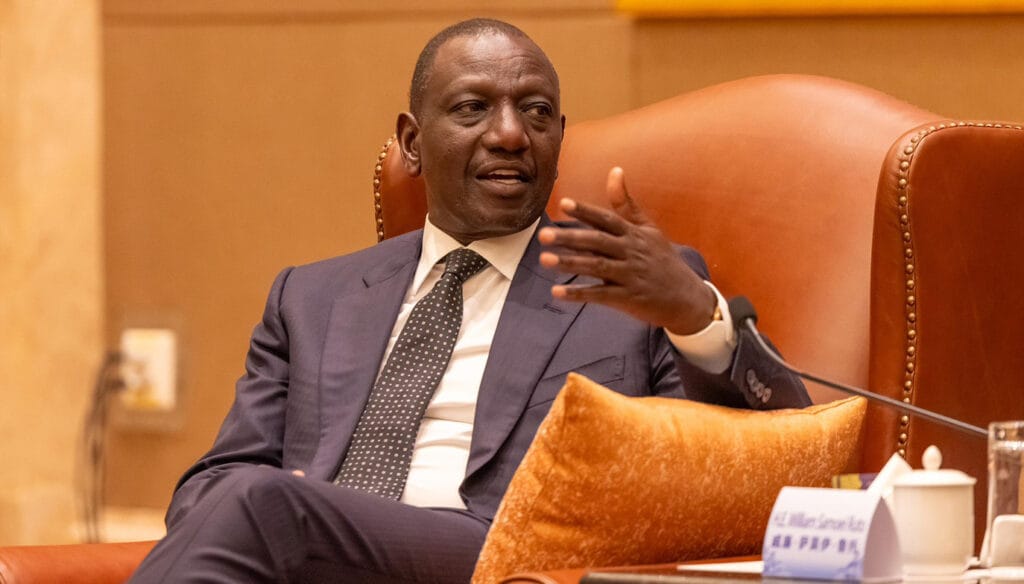In a country accustomed to annual tax hikes and painful levies, President William Ruto’s Finance Bill 2025 is sending shockwaves across Kenya. For the first time in recent memory, the government is proposing a budget with no new taxes. Instead of squeezing more out of already strained citizens, Ruto’s administration is promising a more disciplined approach—cutting unnecessary spending, increasing fairness in taxation, and tightening loopholes that allow corporations and individuals to cheat the system. It’s a bold, almost radical shift in policy. But could it be the change Kenya desperately needs?
The Finance Bill 2025 could mark a pivotal moment for the country’s fiscal and political future. Ruto’s surprising announcement shows a government trying to restore public trust after a bruising year marked by unpopular taxes and protests. In a time when global economies are struggling, Kenya’s new approach is daring and deliberate: “Live within our means.” But what does this mean for Kenyans, for businesses, and for the nation’s economic growth?

The past few years have been hard on Kenyan taxpayers. From the introduction of the housing levy to increased VAT on fuel and essential goods, citizens have been left gasping under the weight of a rising cost of living. The Finance Act 2024, in particular, was a turning point. It triggered nationwide demonstrations and stoked public anger, especially among low- and middle-income earners who felt disproportionately targeted by these measures.
The tax burden had grown significantly over time, with many feeling that the government prioritised revenue collection over addressing deep-rooted inefficiencies and wastage. The Kenya Revenue Authority (KRA) was under pressure to meet ambitious targets, often resulting in aggressive audits and enforcement actions that disrupted businesses. Trust between the government and the governed was fraying.
Then came the shocker: no new taxes in 2025. It’s not just the absence of taxes that’s notable—it’s the accompanying tone. The government is signalling a self-reflective and reformist approach. Instead of digging deeper into taxpayers’ pockets, the administration is now pledging to clean its own house—cutting wasteful expenditure, cracking down on tax evasion, and introducing fairness into the system.
This pivot is rare in Kenyan politics, where populist tax increases have often been the go-to solution for budget shortfalls. It reflects not only economic considerations but also a recognition of the political cost of overburdening citizens. The 2025 bill stands out as a blueprint for responsible governance and potentially a benchmark for future fiscal policy.
The announcement caught everyone off guard. In a region where governments are often expected to increase taxes to fill budget gaps, Kenya’s decision stood out like a sore thumb. Economists and political analysts were quick to debate the implications—was it a sincere reform effort or a political manoeuvre to ease public discontent?
But whatever the motivation, the impact is real. Households, businesses, and investors are all breathing a sigh of relief. The signal is clear: the government acknowledges the strain and is willing to take a different route, even if it means making hard decisions internally.
Let’s not forget that the Finance Act 2024 brought with it the controversial Housing Levy, increased VAT on essential services, and other direct deductions from salaries. These measures sparked protests, online outrage, and a decline in the president’s approval ratings.
In stark contrast, the 2025 bill offers tax relief, transparency, and reform. It repeals unpopular taxes like the 1.5% Digital Service Tax, introduces crypto tax cuts, and aims to hold large corporations accountable through anti-fraud reforms. It is not just a rollback—it’s a recalibration of Kenya’s entire tax philosophy.
One of the central pillars of the Finance Bill 2025 is the commitment to cap Kenya’s budget deficit at 4.5% of the GDP. This might sound like just another economic number, but it has huge implications for the country’s financial stability. By tightening the budget and avoiding excessive borrowing, the government is trying to avoid a debt trap that could cripple public services and investments.
Reducing the deficit means that ministries, parastatals, and county governments will all face spending audits and budget tightening. Projects that don’t deliver value for money may be paused or scrapped entirely. This might hurt in the short term, but it’s a necessary pain to restore fiscal discipline and rebuild Kenya’s creditworthiness.
This phrase—”live within our means”—has become the mantra of the 2025 Finance Bill. It’s not just rhetoric; it’s a directive. Treasury has already begun trimming fat from administrative budgets, slashing travel allowances, freezing unnecessary new hires, and delaying non-essential development projects.
It’s a bold step. Kenya has long been criticised for runaway public spending, with bloated bureaucracies and overlapping government agencies. This new approach signals that the top leadership is ready to lead by example. The question is – will the rest of the government follow suit?
Workers in Kenya’s private sector just got some good news. The untaxed per diem allowance has been increased from Sh2,000 to Sh10,000—a significant and welcome change. This move comes after the same was done for public servants, and it’s aimed at levelling the playing field.
Previously, only government employees enjoyed this tax-free benefit. Now, private sector workers will also enjoy higher non-taxable travel allowances, which is a huge boost, especially for employees who regularly travel for work.
For years, there has been a glaring disparity between how public and private sector employees are treated when it comes to allowances and perks. This change is not just economic—it’s a matter of equity. By aligning these allowances, the government is acknowledging the contributions of all Kenyan workers, regardless of sector.
The move is also a strategic incentive. More equitable treatment of workers can boost morale, increase productivity, and even encourage compliance with tax rules, as employees feel more fairly treated. This subtle yet powerful change speaks volumes about the new tone the government is trying to set: one of fairness, inclusion, and reform.











